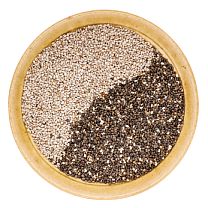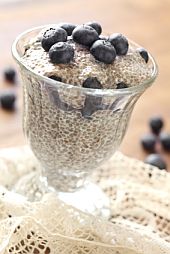Happy New Year!!!
Let this be the year that you make health your priority.

Featured Article
The Health Benefits of Chia Seed: A Tiny Seed That Packs a Nutritional Punch
By Dr. Julie Miller ND
 Chia seeds have made a recent comeback not as a sprouting green cover for the “Chia Pets” popular in the 80s (remember Ch-Ch-Ch-Chia! ?), but because of their incredible nutritional profile and numerous health benefits. I incorporate chia seeds into my diet on a regular basis and recommend that my patients also take advantage of what these amazing little seeds have to offer.
Chia seeds have made a recent comeback not as a sprouting green cover for the “Chia Pets” popular in the 80s (remember Ch-Ch-Ch-Chia! ?), but because of their incredible nutritional profile and numerous health benefits. I incorporate chia seeds into my diet on a regular basis and recommend that my patients also take advantage of what these amazing little seeds have to offer.
Chia, also known as Salvia hispanica, is a flowering plant in the mint family that is native to Mexico and Guatemala and was an important food crop for the ancient Aztec and Mayan cultures. Dr Wayne Coates, author of Chia: The Complete Guide to the Ultimate Superfood, has played important role in its agricultural resurgence and popularization as a nutrient-dense superfood.
Health Benefits of Chia Seed:
- Balances and Stabilizes Blood Sugar: Because chia seeds slow the absorption of sugar into the bloodstream from the digestive tract, they are especially helpful in people with diabetes, insulin resistance, as well kids with fluctuating energy levels. By promoting more balanced blood sugar and thus reducing excess insulin, chia seeds also help to combat belly fat, reduce sugar cravings, and improve overall satiety.
- Amazing Source of Fiber: Chia is approximately 40% fiber (by weight) and 2 tbsp of chia seeds yields 7 grams of fiber. The soluble fiber in chia seeds helps to regulate bowel movements and enhances detoxification by soaking up toxins in the digestive tract and supporting their elimination from the body.
- Packed with Essential Fatty Acids: Chia seed have the highest amount of omega 3 essential fatty acids of any know plant product with 3 grams of alpha linolenic acid per 2 tbsp (18grams). These anti-inflammatory fats are key in supporting the healthy function of the brain and cardiovascular system.
- Good Source of Protein: With just under 20% protein and containing all 9 essential amino acids, chia seeds are an ideal non-animal protein source and an easy way to boost the protein content of meals or snacks.
- Micronutrients Galore: In addition to containing B vitamins and antioxidants, chia seeds are an excellent source of minerals including: calcium (5 times higher than milk!), iron, magnesium, potassium, phosphorus, zinc, and manganese.
- Supports an Active Lifestyle: In addition to having a high energy to weight ratio, chia seeds have the unique ability to absorb approximately 10 times their weight in water which allows them to support and prolong hydration as well as retain electrolytes in the body, especially during physical exertion and exercise.
Chia seeds are very mild tasting and they can be added to almost anything. For breakfast, try adding 1-2 tablespoons to oatmeal, cereal, yogurt, or a smoothie. They can also be incorporated into baking, added to homemade energy bars, or sprinkled over salads, soups, stews, or in sauces. A traditional way to enjoy chia is by combining it with fruit juice for an energy drink called chia fresca. When combined with liquid, chia seeds gel and become soft due to the soluble fiber that surrounds the seed. Unlike flax seed, chia seeds do not need to be ground in order to unlock their nutrient value and when stored in a cool, dry location, chia seeds have a 4-5 year shelf life. The only drawback of chia seeds is that they have a propensity for sticking in your teeth so be prepared to swish with water or floss after eating!
Featured Recipe
Coconut Chia Pudding


